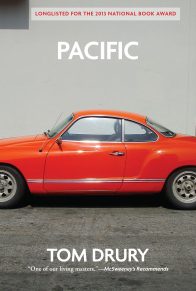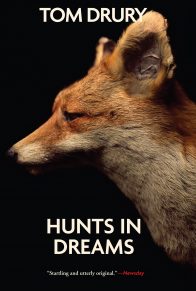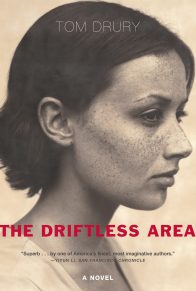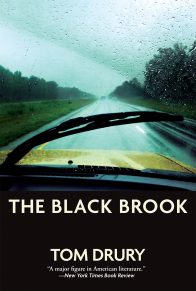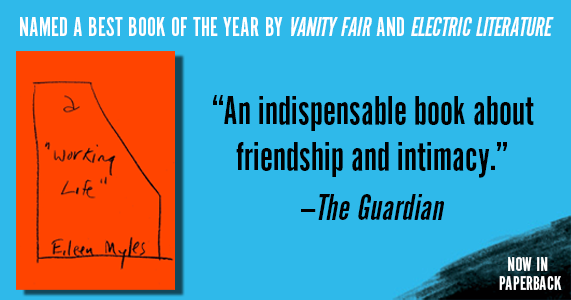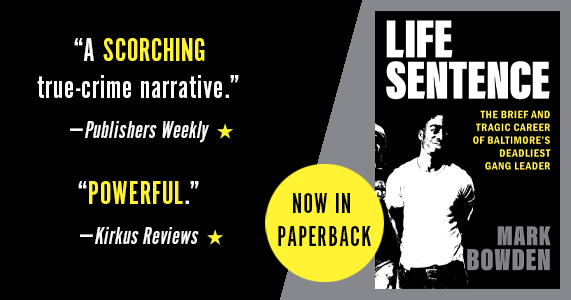One fall they held the blood drive in the fire barn at Grafton. Sheriff Dan Norman was there mainly as a gesture of good will, but one of the nurses didn’t make it, so Dan agreed to place the gauze in the crook of everyone’s arm. “And I thank you,” he would say.
It was early afternoon when Louise Darling came in. Dan knew her somewhat. Tiny Darling was along too—her husband. Dan thought Tiny had done some break-ins at Westey’s Farm Home on Highway 18. There was no real proof.
Louise had a red scarf over her hair. She removed her CPO coat so they could draw her blood. She wore a dark green T-shirt with a pocket. Dan admired her long white wrists and pressed the square of gauze to her pulse.
“I thank you, Mrs. Darling,” he said.
Then came Tiny. He had red hair, and a tattoo of an owl on the back of his hand.
“You ought to be sending this blood to Port Gaspar,” he said.
“Where?” said Dan.
“Port Gaspar,” Tiny repeated. “The Navy sold the Eskimos a load of frozen salmon that turned out to be poisoned. So now they’re sick. They’ve got blood poisoning. And guess what the Navy does. Of course, they send in some lawyers to threaten the Eskimo community.”
“Where is Port Gaspar?” said Dan.
“In the South Pole,” said Louise. She had large green eyes and faded freckles. “We heard the report on the radio. It might not have been the Navy, but they came on Navy boats.”
“As observers,” said Tiny. “They rode on the decks in their own little section, cordoned off with cords. Now the Eskimos need to have their blood flushed out.”
Sheriff Dan Norman released Tiny’s arm and spoke to Nurse Barbara Jones. “Where does this blood go, anyway? All to Mercy?”
“That’s right,” she said, “but I’ll tell you what. One time my second cousin got blood-poisoned. You can’t mess with it. Dan, you know her—my cousin Mary.”
“Mary Ross,” said Dan.
“Mary Jewell,” said the nurse. “Now, her mother was a Ross—Viola Ross. She was first cousins with Kenny Ross, who went to Korea. She couldn’t even walk across the room.”
Louise Darling straightened her coat and tilted her head to the side. “I’m not sure if these were actual Eskimos,” she said.
“It was cold enough to be Eskimos,” said Tiny. “Those lawyers said, Any more complaints, we’re taking down this whole town with a snowplow.”
“Their houses were made of snow,” said Dan.
“Evidently,” said Tiny.
Dan Norman next ran into Tiny Darling at a fight that happened one Sunday night at the Lime Bucket tavern. Dan had especially disliked bar fights ever since the time he got stabbed in the back with a pool cue and ended up going to a chiropractor instead of being outdoors all that summer. The chiropractor kept a bottle of vodka on a big safe behind his desk and insisted on being called Dr. Young Jim because, he said, his deceased father had been known as Dr. Old Jim. This time Tiny had Bob Becker by the hood of a red sweatshirt and was knocking his head against the handles of a foosball machine.
Dan collared Tiny and pulled him outside. The first snow of the year had begun and they could see it falling at a slant all up and down the empty street. Tiny was alert but quite drunk. From what Dan had been able to find out, the fight had been over whether Tanya Tucker was washed up in her career, with Tiny taking the position that she was not.
In the sheriff’s cruiser Dan and Tiny headed southwest on the Pinville blacktop, toward the lockup at Morrisville. About halfway there Tiny took a swing at Dan, and Dan had to pull over, get Tiny out, put the handcuffs on him, and stuff him in the back of the cruiser.
“I always thought you were smart,” said Dan through the cage. “Come to find out I’m sadly mistaken.”
“My arms are going out of their sockets,” said Tiny.
“Just as well be smacking your own head on the handles,” said Dan.
A long silence followed. “You have snow on your hat,” said Tiny.
Dan slowed for a raccoon groping its way across the road. “We know it was you that broke in at Westey’s,” said Dan. “Pretty clumsy on that door, by the way. But it’s beside the fact, since we’re not going to prosecute, so I don’t really know why I bring it up.”
Tiny laughed. “How tall is this cruiser?” he said. “A foot and a half?”
The lights were low at the jail in Morrisville, and inside, the two deputies and some of their friends were projecting slides of nudes onto a map of the county. “I wish I lived on Floyd Coffee’s farm tonight,” said Deputy Earl Kellogg, Jr. Dan told them to cut it out and take Tiny Darling and put him in a cell. Then he sat down to do the paperwork.
“Dopers are out there pushing dope,” said Tiny. “People stabbing that guy in the alley behind the bank. On the other hand is me, who gave blood.”
“What’s your real name, Tiny?” said Dan.
“Charles,” said Tiny. “I’m in the plumbing supply.”
“What a lie,” said Earl Kellogg. “Dan, Ted Jewell’s daughter called. I forget her name.”
“There’s Shea and there’s Antonia,” said Ed Aiken, the other deputy.
“All right,” said Earl. “The junior class there at Morrisville-Wylie is having a dance against vandalism, and this Shea Jewell said they want you to be a chaperon. They had Rollie Wilson from the EMTs, but you know Wilson’s had that fire.”
“We’ll see,” said Dan.
“It’s semi-formal,” said Earl.
Dan unplugged the projector, took the slides, and left. It was still snowing. He took a roundabout way back to Grafton and found himself coming up on Tiny and Louise’s place. Their yard light blinked through the trees. Tiny and Louise rented the white farmhouse that used to be the Harvey and Iris Klar place and was still owned by the Klars’ daughter Jean, who lived thirty miles away, in Reinbeck, and had a job that had something to do with the brick and tile company there.
Dan pulled in the driveway and got out. A white square-headed dog bolted from the toolshed and came leaping over the fine blue snow. The dog hardly made a sound, and Dan talked him into going back to the shed. Meanwhile, Louise Darling had opened the front door. Dan walked over to the house. Someone had lined the foundation with hay bales—that was good. Louise wore jeans and a white sweatshirt. Dan stepped inside, closed the door, and noticed that Louise had no shoes or socks on. The living room was dark except for the violet TV light.
Louise turned on a table lamp. “Where’s Tiny?” she said. She had long full brown hair parted on the side. Over in the corner a black camera stood on a tripod—Louise worked for Kleeborg’s Portraits in Stone City.
“Tiny got in a fight with Bob Becker at the Lime Bucket,” said Dan. “Tiny’s fine, but he’s drunk, so I took him to the Morrisville jail for overnight.”
“He’s not hurt,” said Louise.
“No,” said Dan. “As I say, he won the fight.”
“What’s he charged with?” said Louise.
“I’m not bringing anything,” said Dan. “I wash my hands of it. What are you watching?”
“What does that mean,” said Louise, “if you wash your hands?”
Dan stared at the TV. “He’ll be let go in the morning,” he said. “At eight o’clock in the morning they’ll let him go when they go off their shift.”
Louise went and drank something amber from a small glass. “God damn it,” she said. “Why can’t people leave Tiny alone?”
Dan sat down on the arm of a chair. “Louise,” he said, “in all fairness, people might ask the same of Tiny. He can be pretty obnoxious.”
Louise picked up a pack of cigarettes and sat down on the couch. “This is true,” she said.
“What is this?” said Dan, gesturing toward the TV.
“KROX Comix Classix,” said Louise. “There’s this tired priest, see, and this moth is driving him crazy in his room. The priest had to ride a bicycle over rocks all day.” Louise lit a cigarette.
“Huh,” said Dan.
“It’s a comedy set in Italy,” Louise said.
They watched that for a minute. Dan took off his hat and hung it on his knee.
“My face aches,” said Louise.
Dan went home in his cruiser. He had a fried-egg sandwich and a bottle of Miller beer. He lived in a turquoise and white mobile home outside of Grafton. He looked at the nude slides, but they were too small.
Louise painted her toenails—Dan had noticed that. She painted her toenails dark red. He imagined her dabbing away in some empty room of that drafty farmhouse.
An unusual series of thefts began in February. There were still waves of snow on the ground. The stolen items were huge—combines, feed trucks, even a yellow road grader from the county shed outside Wylie—and seemed to up and vanish. Soon the rumor started that a gang was involved, a possible gang that people called the Freight Haulers. There was much discussion but no consensus.
In the midst of this, old Henry Hamilton had a tractor stolen from his machine shed. When Dan arrived to take the report, Louise Darling was there as well. It was Sunday morning. Louise had blue earmuffs on. Henry kept chickens, and Louise nestled a gray egg carton in the crook of her arm.
They all three went into the machine shed, trailed by Mike, Henry’s part-shepherd. The shed had tin sides and a corrugated ceiling of translucent green plastic. There was a blue Chevy pick-up, an ancient silver corn picker, and a place where the tractor had been. It was quiet. Henry brought up the Freight Haulers.
“They’re supposed to take everything to Texas in secret railroad cars,” he said. “This was an Allis-Chalmers, orange in color, with a radio. I put an umbrella on for shade in the summer. Of course, that’s put away now.”
“Did you lock the shed?” said Dan.
“I never have locked,” said Henry. “I have all my keys confused in a drawer.”
“Might want to rethink that,” said Dan.
“I wonder if it was these freight guys,” said Louise.
Dan walked around scuffing the dirt floor with his boot. “The whole idea is three-quarters myth,” he said.
“What?” said Louise, lifting the blue fur off one ear.
“My opinion, it’s overblown,” said Dan.
“Not according to the fellow from the extension office,” said Henry. “He said there are some things you can let go by, but not when they throw it in your face. He wouldn’t go beyond that. Now, what a guy ought to do, is slip over to the railroad yard and do some asking around with them.”
“I thought they just wanted great big items,” said Dan.
Henry lit his pipe and fanned out the match. “That was a good-sized tractor,” he said.
Mike slowly raised his head and barked once at the lime-colored light through the ceiling.
“Mike’s trying to say it was guys from space,” said Louise.
“No, Mike sees that swallow poking out his head,” said Henry.
Louise and Dan left the shed and walked over by the hog pen in front of Henry’s barn. It was cold. Louise’s cheeks were red. She slipped the toe of her boot through the rail, and some pigs came over to chew on it.
“You’re not missing anything, I hope,” said Dan.
Louise pulled her earmuffs from her head, the blue pads coiling together. “There were lights going by last night,” she said. “That’s all. I thought it could be Tiny—these lights going up and down the wallpaper. Tiny and I got separated, and it occurred to me he might be mad about that.”
“You and Tiny?” said Dan. “No kidding.”
Louise wiped her nose with the back of her glove. “We weren’t getting along,” she said. “We would talk but it wouldn’t be about anything.”
“What makes you say he might be mad?” said Dan.
“Who wouldn’t be?” said Louise. “It was seven years, practically. You begin to wonder what you had in mind the whole time.”
“Did he ever threaten to or actually hit you?” said Dan.
“No,” said Louise. “He might have taken a swing but it never would hurt.”
“Because there’s no reason you have to sit around living in fear,” said Dan. “That isn’t written anywhere.”
“Not mad like that,” said Louise. “Tiny would never hurt the individual person. More frustrated kind of mad.”
“But you’re still on the farm,” said Dan.
“I still am,” said Louise. “Tiny went to live with his brother Jerry Tate in Pringmar. It’s good in the sense that Jerry racked up his snowmobile on New Year’s Eve. He was wearing a scarf that got caught in the belt thing.”
“God damn,” said Dan.
Louise opened and closed the egg box. “Jerry is lucky to be alive,” she said. “It’s a trial separation.”
“We can give you what we call special attention,” said Dan. “We can come by your place on our patrols. It’s not really the height of security, but it’s still something.”
“All I have is the rusty Vega,” said Louise. “The whole bottom is about to shear off. They could haul that freight right now—it’d be O.K. with me.”
“You know, though,” said Dan, “Sometimes you drive by a pickup and it might be parked on the shoulder with the flashers on. Now, say there’s baled straw all over the road, maybe there’s a man, there’s a woman, picking up the bales. Well, it’s easy to see what happened. But it’s too late to tie them tighter, obviously.”
“O.K., I’m lost,” said Louise, and she blinked. Dan was quiet for a moment. He could almost hear her eyelids going poink, poink.
“When the bales fall off,” he said.
Henry came around the corner of the barn with a bucket in his hand. “That’s right, you needed eggs,” he said. He led them into the low red chicken house. The room was warm and hazy and full of straw. The chickens beat their wings and ran like mad in every direction. Dan got the crop duster Paul Francis of Chesley to take him up to look for the stolen machinery. They got off from the Stone City airport and headed south. The county had its winter colors—gray and bark brown shot through with strips of pale white. After a while, Paul, like all small-plane pilots in Dan’s experience, wanted Dan to try the wheel.
“Look left,” said Paul. “Look right. Look up. You even have to look up.”
The sun came out. “Where would you put a road grader?” said Dan.
“Keep your eyes moving,” said Paul. “Where could you bring her down if an emergency happened?”
“Back to you, in that case,” said Dan.
The small plane droned into the blue air. The engine roared and the heater blasted, but the cold was like a brilliant curtain all around them. When Dan tested the responsiveness of the wheel, the wing tilted and the plane headed into the watery space above.
“Level, level,” said Paul. Dan scanned a row of black instruments leading to a red and gold medallion that said, “The Sky Is Thine, O Lord.”
“You’re not looking,” said Paul. “Disregard the panel at this stage. I’ll tape them gauges up with masking tape.”
“I hate this,” said Dan. “I don’t want to be the pilot. That’s what you’re for, and how about taking me over Martins Woods? I mean it. Lesson over, king’s ex.”
“All right,” said Paul.
They said nothing for a while. Dan watched the snowy fields, the shimmering creeks, the cars on slick blacktop.
“Have you given any thought to joining our Methodist prayer group?” said Paul.
“No,” said Dan.
They flew for another hour. When Paul came in to land at Stone City he didn’t like the set of his wings, so he pulled up and went around again. They flew right into the sun, and Dan put his hand over his eyes. Paul still wasn’t overly pleased with the setup, but he brought the plane bouncing down on the runway. Dan banged his ear against the door of the plane.
Dan met Louise at Kleeborg’s Portraits at the end of the day. They took the cruiser out to a tuxedo shop on Old Highway 18. There was one green car in the parking lot.
“It looks pretty closed,” said Dan.
“No, because it’s Thursday, and all the retail stores are open until nine on Thursday,” said Louise. “Is this like a date?”
“Is what like a date?”
“This right now.”
“I don’t know. More or less.”
Dan got out of the car, and Louise joined him on the sidewalk, where they stood looking at the rows of shiny jackets. “You can’t tell me this place isn’t closed,” said Dan.
But he pushed the door, and it opened. A small barrel-chested man in jeans and pointy sideburns and tiny cowboy boots stood looking at a cummerbund. “The lady left,” he said. “There was a lady here a while ago, but now she’s left.”
“Are those flares?” said Louise, pointing to the cuffs of the man’s jeans.
“They’re boot cut,” he said, and then he was out the door.
Louise watched him drive away in the green car. “Boot cut, my ass,” she said.
Dan looked into a little room in back. “Hello?” he said. A woman lay on a green vinyl davenport with her eyes closed.
“Is she dead?” said Louise.
Dan shook his head. “Her stomach’s moving,” he said. “I think she’s asleep.”
“Well, what should we do?” said Louise.
“I have a black coat,” said Dan. “And I have black pants. So all I need, pretty much, is a tie.” He picked out a narrow bow of red plaid, held it under his chin, and cleared his throat.
“Wait,” said Louise. She found a white shirt in cellophane and pressed it to his chest. “I don’t think you’re supposed to wear plaid unless it’s the actual tartan of your clan.”
“Keep in mind this is only semi-formal,” said Dan.
“It was on National Geographic,” said Louise. “They had a special about Scotland.”
“I forget which tartan my clan does favor,” said Dan.
“Get the shirt, too,” said Louise. She went over and tried on a powder-blue jacket with winged lapels. Her fingertips barely cleared the cuffs as she turned before a three-way mirror. “Check out this ugly son of a bitch,” she said.
Dan slipped the tie in his pocket and came over. Louise looked into the planes of the mirror, her hair tucked into the jacket collar. Dan lifted Louise’s hair and laid it like cloth on her shoulders. He saw a row of her in the mirror. She pressed the back of her neck against his hands. Her eyes closed, then opened: poink.
“You hurt your ear,” she said. They began to kiss.
At the End of Vandalism Dance, held in the Grafton gym, Dan stationed himself near the punch table to watch out for spikers. He spoke with Mrs. Thorsen, the small, strangely high-waisted science teacher. A band called Brian Davis and Slagheap played their own songs plus covers they had customized to reflect the theme. Every now and then Dan would go to the lobby doors and look out, to chase away the drinker kids hanging around the street lamp in their cars.
The gym was dark except for stage light, and the music rattled through it like sheets of tin. When the dancing was fast it reminded Dan of the Pony, and when it was slow it reminded him of people wandering in the cold. In the center of the floor the shop class had built a mysterious display. It was a row of tall, pointed wooden slats with a double-hung window built in and a flashing yellow light bolted to one side.
“It’s a collage of the different vandalism things,” said Mrs. Thorsen. She wore a yellow dress and her eyes were exaggerated by mascara. “You have the fence, the glass, the construction light. They were going to make another one and go ahead and break the glass and paint on the fence, and show the before and the after. I’m not sure why they didn’t, because probably it would have been better.”
“Probably,” said Dan.
“But I’m not going to say anything,” said Mrs. Thorsen, “because the shop class always takes such intense shit. Every dance is the same. You should have seen their Stairway to Heaven.”
After the intermission, Brian Davis came back with Slagheap and played “Rikki Don’t Throw That Lumber.” Mrs. Thorsen started telling Dan about the chinchillas she was raising with her husband. She practically had to shout. Something was wrong with the chinchillas, Dan couldn’t quite understand what. About this time Tiny entered the gym with a blue wrecking bar. Later everyone would say it had been like a music video, with dancers parting as if by hypnosis and the band playing “China Grove.” Dan had his back turned, but Mrs. Thorsen in her yellow dress was watching as Tiny moved past the punch area. He glided to the vandalism collage and swung the head of the crowbar through the window, spraying glass toward the stage. He exploded the orange light and splintered the planks of the fence. Then Dan got to him and tried to enclose him in his arms. “Whoa, whoa, China Grove,” sang the band. Tiny set his shoulders and shrugged out of Dan’s hold. Somehow Dan caught the head of the crowbar on the temple. It was probably not intentional, just a little whack on the temple. Dan fell back against the fence, and Tiny ran out.
By the time the glass and the other mess had been swept up and Dan had convinced Mrs. Thorsen to go on with the dance, Tiny was gone and the drinker kids had strategically moved their cars to the ball diamond across the street. Dan slipped on his suit coat and got into the cruiser carefully. He knew he had been hit on the head but thought it was not bad. He tried to radio in about what had happened, but when he turned the knob to tune the frequency, the light went out behind the dial.
He drove east on the gravel road to Louise’s house, where he found her sitting at the kitchen table, with a camera taken apart and neatly laid out in front of her.
“I must be psychic,” she said. “I saw a show about police to-night, and here you are in my kitchen.”
“Has Tiny been here?” he said.
“A couple days ago,” said Louise. “It was funny what he wanted. He wanted this old shot glass he got one time at the Sands Hotel in Las Vegas. ‘Where’s my little Sands glass?’ he said. ‘Where’s my little Sands glass?’ I had no idea what he was talking about. I’m going, ‘Which glass, Tiny? A glass with sand in it?’ But he had to have that glass.”
“What did he want it for?” said Dan.
She shrugged, examining a small red-handled screwdriver in her hand. “I guess to drink out of,” she said. “He wanted some other glasses, too. I guess his brother Jerry doesn’t have much for the kitchen.”
“Are you all right?” said Dan.
Louise nodded. “Except for this camera,” she said.
Dan looked at the camera parts on the checkered tablecloth—springs and mirrors and pins.
“Give me your hand,” he said. She did. Her fingers were strong and warm. “Thanks,” he said. They held hands across the table.
“You’re welcome,” said Louise.
Dan called Deputy Ed Aiken on Louise’s telephone and arranged to meet him at Tiny’s brother’s place in Pringmar. Jerry Tate lived in a gray bungalow on land that sloped down from the road. Heavy bushes surrounded the house, and Christmas lights still burned in the windows. Jerry Tate invited them in to sit but said he could not make coffee because he wasn’t supposed to move around after nine o’clock.
“I had a run-in with a snowmobile,” said Jerry. “Seven little plates have gone out of kilter. I might not come back one hundred percent. But the doctor says it shouldn’t interfere with my plans.”
“What plans are those?” said Dan.
“It’s a figure of speech,” said Jerry.
So Ed Aiken made coffee, and they drank it, and after a while Jerry said it wasn’t his business but it seemed to him that Tiny might keep going if he saw the cruisers out front. Dan and Ed went to move the cars and talk things over, and when they came back Jerry had locked the house up and turned off the lights.





